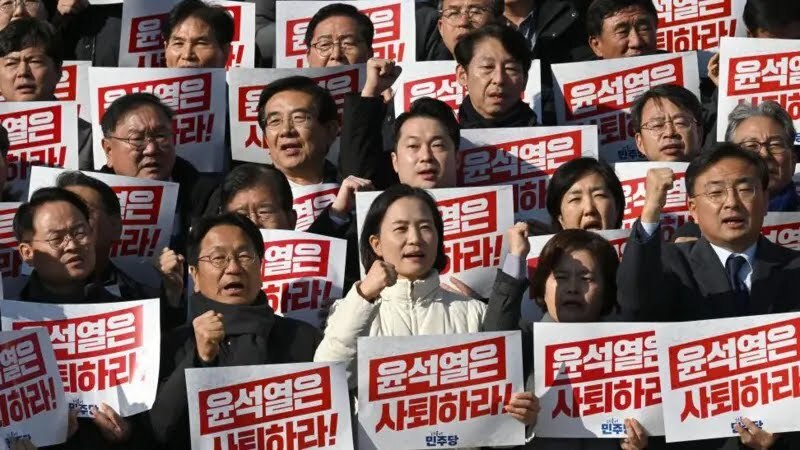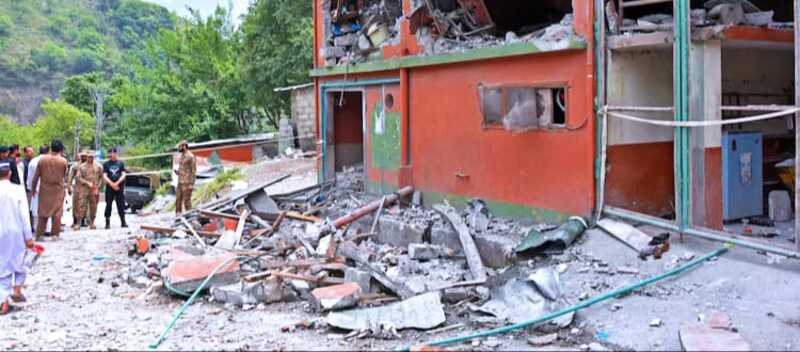 Lawmakers and SouthKorea's opposition leaders hold placards in a rally calling for resignation of President Yoon Suk Yeol. Image: AFP
Lawmakers and SouthKorea's opposition leaders hold placards in a rally calling for resignation of President Yoon Suk Yeol. Image: AFP
Crisis In South Korea: President Yoon Declares Martial Law, Parliament Strikes Back
Asia
Politics
On December 3rd, 2024, South Korean President Yoon Suk Yeol declared martial law, sparking a new political storm in the country and the region. The decision was attributed to anti-state statements supporting North Korea and growing concerns about the influence of pro-North Korea forces among South Koreans.
Political Tensions Under Yoon Suk Yeol's Leadership
Since his election in 2022 after defeating the Democratic Party’s nominee, Lee Jae Myung, Yoon Suk Yeol's presidency has been marked by heightened political temperatures. He has accused parliament of interfering with government policies, being pro-North Korea, and housing elements he described as “criminals.”
Martial Law: A Shocking Declaration
The declaration of martial law was unexpected, recalling the era before South Korea’s pro-democracy movement against military rule in 1980. Under martial law, all political activities and protests were banned, and the military was given unlimited authority to enforce the decree. Yoon justified his decision in a televised address, stating it was necessary to protect South Korea from anti-state elements.
Immediate Backlash and Swift Parliamentary Action
The imposition of martial law led to protests within parliament, which moved quickly to overturn the president’s decision. Within hours, parliament convened and overwhelmingly voted to lift martial law. This forced President Yoon to withdraw the military from parliament and restore normalcy, although the political turmoil persisted.
Opposition and Calls for Resignation
The opposition, led by Lee Jae Myung, voiced concerns that the declaration of martial law was a crisis for South Korea’s democracy. His sentiments were echoed by parliament, trade unions, and the general public, who expressed discontent with Yoon's leadership. The opposition has since filed a motion to impeach the president, signaling a lack of confidence in his administration.
U.S. and Geopolitical Concerns
The declaration of martial law raised alarm among South Korea’s allies, particularly the United States. With U.S. troops stationed in South Korea as a nuclear deterrent against North Korea, the announcement created concerns about the stability of the region and its potential ripple effects on geopolitics.
A Divided Nation and Changing Political Landscape
The push-and-pull between the legislature and executive branches has left South Korea deeply divided. The political landscape has shifted dramatically, with calls for Yoon’s resignation and increasing criticism of his leadership style and policies.
South Korea's Uncertain Path Forward
President Yoon Suk Yeol’s declaration of martial law, though short-lived, has left an indelible mark on South Korea’s political scene. The world watches closely as the nation navigates this storm, and its citizens await the next steps from their leader. Whether South Korea moves toward stability or deeper political division will shape the country’s future on both domestic and global stages.
Political Tensions Under Yoon Suk Yeol's Leadership
Since his election in 2022 after defeating the Democratic Party’s nominee, Lee Jae Myung, Yoon Suk Yeol's presidency has been marked by heightened political temperatures. He has accused parliament of interfering with government policies, being pro-North Korea, and housing elements he described as “criminals.”
Martial Law: A Shocking Declaration
The declaration of martial law was unexpected, recalling the era before South Korea’s pro-democracy movement against military rule in 1980. Under martial law, all political activities and protests were banned, and the military was given unlimited authority to enforce the decree. Yoon justified his decision in a televised address, stating it was necessary to protect South Korea from anti-state elements.
Immediate Backlash and Swift Parliamentary Action
The imposition of martial law led to protests within parliament, which moved quickly to overturn the president’s decision. Within hours, parliament convened and overwhelmingly voted to lift martial law. This forced President Yoon to withdraw the military from parliament and restore normalcy, although the political turmoil persisted.
Opposition and Calls for Resignation
The opposition, led by Lee Jae Myung, voiced concerns that the declaration of martial law was a crisis for South Korea’s democracy. His sentiments were echoed by parliament, trade unions, and the general public, who expressed discontent with Yoon's leadership. The opposition has since filed a motion to impeach the president, signaling a lack of confidence in his administration.
U.S. and Geopolitical Concerns
The declaration of martial law raised alarm among South Korea’s allies, particularly the United States. With U.S. troops stationed in South Korea as a nuclear deterrent against North Korea, the announcement created concerns about the stability of the region and its potential ripple effects on geopolitics.
A Divided Nation and Changing Political Landscape
The push-and-pull between the legislature and executive branches has left South Korea deeply divided. The political landscape has shifted dramatically, with calls for Yoon’s resignation and increasing criticism of his leadership style and policies.
South Korea's Uncertain Path Forward
President Yoon Suk Yeol’s declaration of martial law, though short-lived, has left an indelible mark on South Korea’s political scene. The world watches closely as the nation navigates this storm, and its citizens await the next steps from their leader. Whether South Korea moves toward stability or deeper political division will shape the country’s future on both domestic and global stages.
Senior Editor: Kenneth Njoroge
Financial Expert/Bsc. Commerce/CPA
